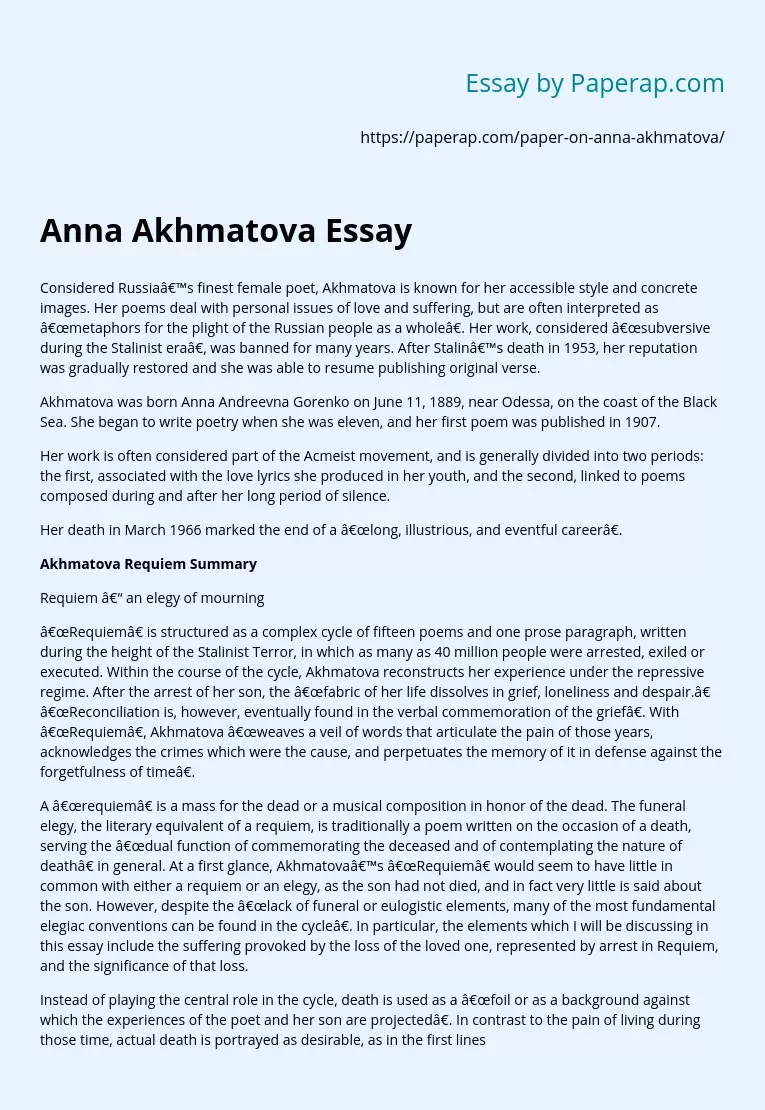Anna Akhmatova Essay
Considered Russia’s finest female poet, Akhmatova is known for her accessible style and concrete images. Her poems deal with personal issues of love and suffering, but are often interpreted as “metaphors for the plight of the Russian people as a whole”. Her work, considered “subversive during the Stalinist era”, was banned for many years. After Stalin’s death in 1953, her reputation was gradually restored and she was able to resume publishing original verse.
Akhmatova was born Anna Andreevna Gorenko on June 11, 1889, near Odessa, on the coast of the Black Sea.
She began to write poetry when she was eleven, and her first poem was published in 1907.
Her work is often considered part of the Acmeist movement, and is generally divided into two periods: the first, associated with the love lyrics she produced in her youth, and the second, linked to poems composed during and after her long period of silence.
Her death in March 1966 marked the end of a “long, illustrious, and eventful career”.
Akhmatova Requiem Summary
Requiem – an elegy of mourning
“Requiem” is structured as a complex cycle of fifteen poems and one prose paragraph, written during the height of the Stalinist Terror, in which as many as 40 million people were arrested, exiled or executed. Within the course of the cycle, Akhmatova reconstructs her experience under the repressive regime. After the arrest of her son, the “fabric of her life dissolves in grief, loneliness and despair.” “Reconciliation is, however, eventually found in the verbal commemoration of the grief”. With “Requiem”, Akhmatova “weaves a veil of words that articulate the pain of those years, acknowledges the crimes which were the cause, and perpetuates the memory of it in defense against the forgetfulness of time”.
A “requiem” is a mass for the dead or a musical composition in honor of the dead. The funeral elegy, the literary equivalent of a requiem, is traditionally a poem written on the occasion of a death, serving the “dual function of commemorating the deceased and of contemplating the nature of death” in general. At a first glance, Akhmatova’s “Requiem” would seem to have little in common with either a requiem or an elegy, as the son had not died, and in fact very little is said about the son. However, despite the “lack of funeral or eulogistic elements, many of the most fundamental elegiac conventions can be found in the cycle”. In particular, the elements which I will be discussing in this essay include the suffering provoked by the loss of the loved one, represented by arrest in Requiem, and the significance of that loss.
Instead of playing the central role in the cycle, death is used as a “foil or as a background against which the experiences of the poet and her son are projected”. In contrast to the pain of living during those time, actual death is portrayed as desirable, as in the first lines of “Prologue”: “That was when the ones who smiled / Were the dead, glad to be at rest”. Hence death becomes a method of escape from the misery of living.
In “Requiem”, the uncertainty, helplessness and injustice that accompany the arrest of a family member is a fate that makes life outside the prison no more desirable.
“Requiem is an elegy mourning the loss of life for the wives and mothers left behind: the women are depicted as lacking basic human qualities, such as warmth, breath and identity. In “Epilogue I” their cheeks are stiffened and etched as if petrified and their hair is turned gray. In “Instead of a Preface”, the woman is described as faceless with blue lips, an image that is also echoed in “I”, where the arrested son is described as having cold lips. These descriptions of the women emphasize the loss of identity and a reduction to an almost “animal-like state”.
To conclude, I believe that Anna Akhmatova is effective in bearing witness to the oppressive silence during Stalin’s reign of terror and her work offers great insight into that dark world.
Anna Akhmatova Essay. (2019, Dec 05). Retrieved from https://paperap.com/paper-on-anna-akhmatova/

